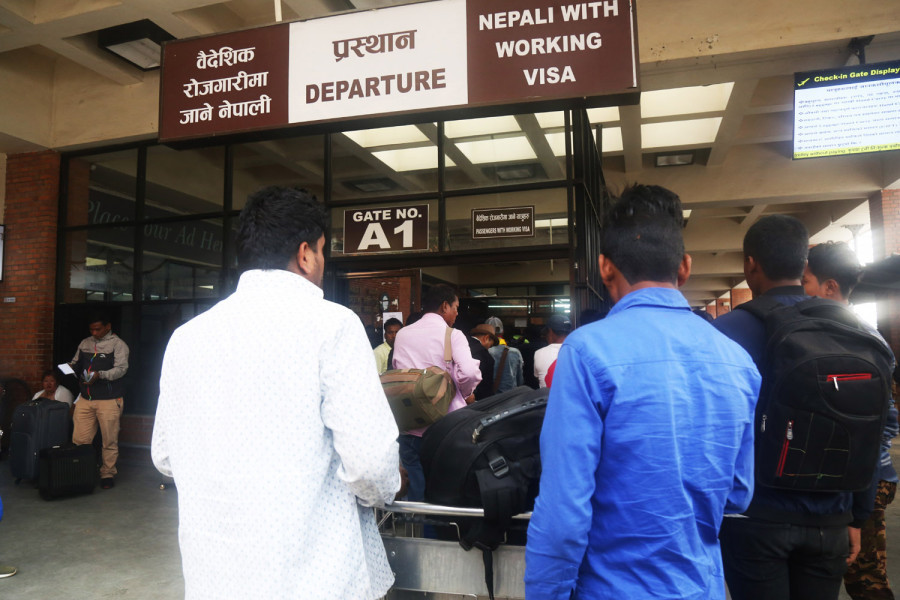National
Migrant workers with conflicting biometric details to be barred from flying abroad
The move comes as many pre-departure training centres were found not orienting the workers to their job needs.
Chandan Kumar Mandal
As pre-departure orientation training provider agencies are found to have been flouting the rules, the government has come up with strict measures for curbing the malpractice.
The Department of Foreign Employment decided that it will not allow the migrant workers whose biometrics details submitted at pre-departure orientation centres do not match with the database at the labour desk of the Tribhuvan International Airport to fly to foreign destinations.
In a notice, the government body that oversees the foreign employment sector has warned that workers would be barred from departure starting April 14 if their biometric details recorded during the application process don't match during checks before flying to labour destinations.
According to Kumar Prasad Dahal, the decision was taken after many pre-departure orientation providers had not been conducting training for aspirant workers.
Many pre-departure orientation providers had been misusing the online system where they would register the names of candidates but not provide any training, said Dahal.
“They would also use biometrics, which is the thumbprint, during the application process of someone other than the real candidate. Therefore, we have decided that if workers' thumbprints differ at the airport, they will not be allowed to depart.”
Private agencies which conduct such training have to upload the names of the candidates online on the Foreign Employment Information Management System, a day before the actual training. FEIMS is an integrated online platform where details of migrant workers and services related to foreign employment are available. It connects all major stakeholders of labour migration.
A male migrant worker pays Rs700 for the pre-departure training, whereas the Foreign Employment Board pays fees for the orientation training on behalf of female workers.
Once aspirant workers complete the 12-hour long orientation, which goes on for two days, their details are available on FEIMS. Only then do Labour Offices issue permits to applicants to work abroad. Before workers board their flight, their biometric details are verified one last time at the airport labour desk.
However, the department, which has intensified monitoring of such agencies, found that candidates were not even present in the classroom at the stipulated time.
The majority of orientation providers were found not conducting the training whereas some of the agencies did not even have proper classrooms, revealing that the biometric details were wrongly filled during the application process and workers were simply given certificates.
“They have been operating the whole office in their bags. They would carry the equipment and do the registration from elsewhere but not from their offices as the candidates do not have to be present in person for the registration process,” said Dahal.
“When we started monitoring such agencies in Kathmandu, they had started registration from outside the Valley, believing that we cannot reach there for inspection. Therefore, we have focused our action on the final exit, which is the airport, for eliminating such malpractices.”
Pre-departure orientation training is mandatory for all migrant workers. Over the two days of training, workers are given useful information about the destination countries, including their rules and regulations, traffic rules, labour laws, and local cultures and traditions. They also receive information on occupational and workplace safety, communicable diseases and information related to personal care in the labour destination.
The government recently upgraded the seven-year-old curriculum for the pre-departure orientation for making it comprehensive in protecting Nepalis working abroad. But the agencies not even conducting the training emerged as a new challenge for the authorities.
“The biometric details are used so that workers can receive re-entry work permits even online. Also for accessing insurance and financial assistance provided by the government, workers’ details should match,” said Dahal.
“During the orientation, workers are made aware not only of their physical and mental health but also their rights at [their work station]. Not getting proper training will leave them vulnerable. We cannot let them go without the training.”
However, stopping workers right before boarding their flights will not bring them any consequences, the department of foreign employment says. It is the erring agencies that disregard the standard procedures of providing training who will face action.
“Even when workers’ biometrics won’t match at the airport, action will not be taken against them. They are rather a victim of the malpractice even after paying the fees for the training,” said Dahal.
“The compensation to the worker and airfare will be paid from the Rs500,000 which pre-departure training providers deposit as guarantee for operating their business. Workers will not suffer any losses.”




 9.89°C Kathmandu
9.89°C Kathmandu














